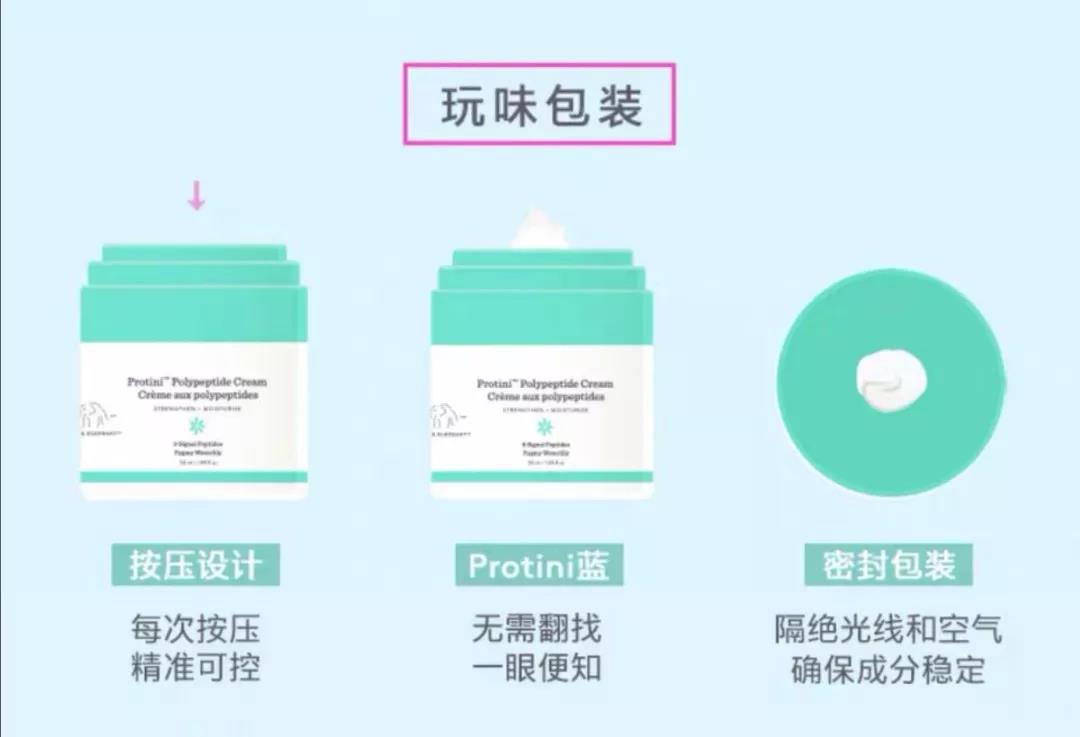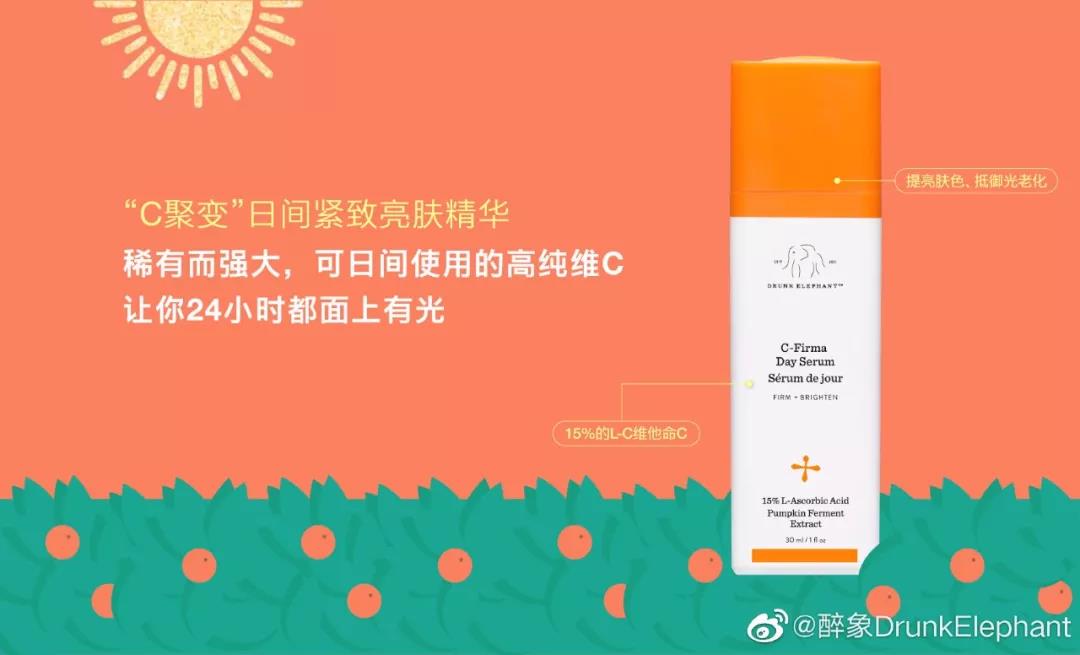- 2020-12-25
- 阅读量:2900
- 来源|CBO
- 作者|Jiang Wen
Drunken Elephant, one of of the fastest growing skincare brands in the USA, entered the Chinese market and was acquired by Shiseido in the second half of 2019. How would this influential new comer develop in the Chinese market?
The Drunk Elephant, founded less than eight years ago, was estimated to be worth USD 1 billion. It was once coveted among cosmetics magnates such as Estee Lauder, Unilever, and Shiseido, and it became an emerging brand in the spotlight of the global cosmetic industry.

2019 was a big year for Drunk Elephant. It entered the Chinese market in September (launched in Tmall and Sephora, Hong Kong at almost the same time) to tap the market with the greatest potential globally. It was acquired by Shiseido at a high price of RMB 6 billion in October, thus breaking the glass ceiling and embarking on its journey of globalization.
What strategies would the newcomer adopt? Will its unique skincare philosophy help it go far? CBO thus interviewed Su Jiani, General Manager of Drunk Elephant China, and shed light on the mavrick Drunk Elephant behind all the dazzling lights.
 △ Su Jiani, General Manager of Drunk Elephant China
△ Su Jiani, General Manager of Drunk Elephant China
01
“Hardcore skincare”
The brand story of Drunk Elephant sounds familiar within the industry—as a mother of four kids deeply troubled by skincare issues, Tiffany Masterson was not satisfied with any skincare products on the market because she didn’t think they were able to solve her skincare issues. Then what? Why not start up on brand on her own?
Talented and ambitious Tiffany transformed her role from consumer to entrepreneur, and started up Drunk Elephant in 2012.
 △ Tiffany Masterson, founder of Drunk Elephant
△ Tiffany Masterson, founder of Drunk Elephant
Drunk Elephant has had the mission of “solving skincare issues” since its founding.
You may notice from Drunk Elephant’s Tmall shop that its top 3 sellers are anti-aging ProtiniTM Polypeptide Cream, rescuing and recovering Lala RetroTM Whipped Cream, and Virgin Marula Luxury Facial Oil that contains Vitamin E, OMEGA6 and OMEGA9. Specific ingredients such as “9 signal peptides”, “6 rare African oils”, “ceramides” and “15% l-ascorbic acid” are clearly indicated under products names on packages. Generous volume of functional ingredients and clear-cut indication of functional ingredients on packages make it a hardcore skincare brand.

It is Drunk Elephant’s goal to solve skincare issues, and it’s a ground rule to avoid hazardous ingredients. It is known that its products have strong technological assurance for product safety to ensure easy absorption and no burden for the skin. All the products are free from six risky ingredients, namely essential oils, silicone, chemical sunscreen, ethanol, surface-active distributors, fragrance and pigment. It’s also worth emphasizing that Drunk Elephant is not fussed if functional ingredients are natural or artificial. Ingredients are good as long as they are safe and effective.
In terms of product categories, there are 30 products in its overseas Tmall shop in creams, serums (facial oils), sunscreens, lip balms, eye creams and facial masks. The price ranges from lip balm at RMB 150 to AHA serum at RMB 1,110, and there are skincare packages between RMB 744 and 1458. Such full category, concise but precise products and quality assurance with middle and high end prices enable the brand to fulfill young consumers’ personal needs to the maximum degree.
Its simple but cute packages attract a lot of followers. Products in multiple Macaron colors look like toys and ornaments on dressing tables. Its design connects with the girly side of young consumers. As Su Jiani explained, the package is aimed to offer consumers happy and pleasant skincare experience. In fact, Drunk Elephant manages to balance design and practical use. For example, the classic ProtiniTM Polypeptide Cream adopts a pump design that prevents oxidation and ensures pureness and stableness of the ingredients.
 △ Clever design of ProtiniTM Polypeptide Cream, Drunk Elephant
△ Clever design of ProtiniTM Polypeptide Cream, Drunk Elephant
Last but not least, its unique skincare philosophy is refreshing. Consumers are used to multiple steps of skincare procedure , which are tedious and may start pilling up if used improperly. Drunk Elephant advocates mixture instead of multiple layers. According to Su Jiani, because its products don’t contain any silicone or other intervening ingredients, they are biologically compatible, meaning consumers may mix its serum, cream and oils like a milkshake. The customers make a skin care milkshake in the palm of their hands so the process is very interactive.

△ Screenshot from Drunk Elephant’s Tmall shop
Drunk Elephant set the trend of clean beauty in the USA and European market with its unique position, offbeat philosophy and bright and lively design, and it is quite popular in the USA. Its effectiveness makes it increasingly known by word of mouth in China. Consumers think highly of the brand on Xiaohongshu and other social media, “it contains cutting-edge functional ingredients. It’s all about ingredients and effectiveness”, “it’s kind of magic but clean and mild. It makes your skin smooth, silky and brighter.”

△ Screenshots from Xiaohongshu
The brand is very popular with consumers, which is exactly what the senior management of Shiseido, the top beauty and cosmetics group in Asia, expect. Masahiko Uotani, President and CEO of Shiseido, once described Drunk Elephant as “one of the fastest growing skincare brands in history”. As he stated, its devotion to skincare is relatable to loyal consumers and it pays special attention to complete and effective recipes while integrating fun elements, all of which lead to its initial success.
02
After being acquired by Shiseido, Drunk Elephant is expanding its presence in Asian market
Drunk Elephant made it to number one on Sephora’s rating list within the first year of its founding, and it managed to remain in the top 3 for multiple consecutive times. There is no denying that its strength to quickly ascend at such a young age in the fiercely competitive skincare market.
As CBO have learned from the brand, not long after its founding, Drunk Elephant received investment from VMG Partners based in San Francisco, a private equity investment entity, and Leandra Medine, a fashion blogger. Hence its growth multiplied.
While the brand was booming in markets of the USA and Europe, Drunk Elephant didn’t enter the Asian market until 2019. As Asian market features the fastest growth around the world, it was inevitable for the brand to enter the Chinese market and Asian market overall.
In October, Drunk Elephant was acquired by Shiseido at USD 845 million. Shiseido boasts intrinsic geographical advantages and vast market resources in the Asian market.
In this regard, Shiseido stated publicly that Drunk Elephant will be able to expand its presence in new markets including America, Europe and Asia with its global platform and unique resources. It will offer the brand professional knowledge and network information through its Global Innovation Centers and Centers of Excellence, and fully support its constant growth and development in all channels.
Marc Rey, CEO of Shiseido Americas & Chief Growth Officer Shiseido Group, also said, “Drunk Elephant is shaping people’s idea about and experience of beauty with its efficient, clean and compatible products. Its unique philosophy fits well with Shiseido’s values and skincare traditions. I believe the brand will contribute to business development of Shiseido Americas.”
Undoubtedly, the acquisition means a lot to Shiseido and Drunk Elephant. On one hand, Drunk Elephant’s good reputation and presence in America may help Shiseido develop its global presence and continue to improve its international influence. On the other hand, Drunk Elephant may get adequate innovative resources from Shiseido and speed up its growth in Asian Market.
As insider Priya Rao said, “Drunk Elephant has drawn the millennials’ attention. The brand is all about skincare, and it’s important to stick to the point. Besides, as Shiseido dominates Asian market, and made technological investment recently, Drunk Elephant is seizing the opportunity of huge growth.”
03
What is the prospect of Drunk Elephant in Chinese market?
“There is no reason to wait any longer”, Tim Warner, CEO of Drunk Elephant, said. It is an essential strategy to enter the Chinese market considering its market strength and local consumers’ skincare preferences.
In September 2019, Drunk Elephant opened its Tmall shop. The brand is also available on Xiaohongshu, Yitiao App and other social media platforms (cross-border channel). According to Su Jiani, the brand is also considering other distribution channels. As the journalist observed, retail prices of its products are almost the same as in the USA.

Drunk Elephant’s entry into China caused an upsurge of interest among certain consumers. “Cute package”, “hardcore ingredients” and “offbeat attitude” became points of interest for consumers, and made the brand even more influential. A lot of users revealed their purchases of the brand after the double 11 shopping festival.

For most foreign brands, Tmall and other online platforms are their first choices when they enter the Chinese market. However, long-term development requires the development of offline channels. The journalist interviewed the individual in charge at Wangfujing Department Store in Beijing about his opinion of bringing in niche brands like Drunk Elephant from America and Europe. According to him, Shiseido’s endorsement is quite good but the department store would also consider brand strength, i.e. its influence and marketing efforts.
In his view, consumers currently make perceptual purchases. Hence, marketing through celebrities and KOLs( Key Opinion Leaders) plays a significant role in building up brand influence. Moreover, skincare newcomers coming into the Chinese market should prioritize reputation and influence building.
Drunk Elephant is quite confident about if future growth in China. Just as Su Jiani said, “Contemporary consumers care about performance-price ratio, and they are looking for effectiveness and precision when it comes to skincare. That is our opportunity. In future, Drunk Elephant will put efforts in R&D, launch more comprehensive skincare lines, continue to pay attention to user experience, encourage them to share their experience, and provide more professional skincare services for them.”










